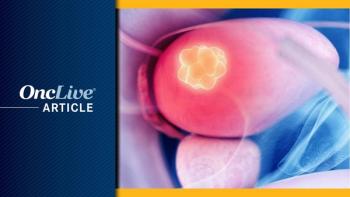
Dr Katims on the Goal for Investigating the Immune Phenotype of FGFR3+ Upper Tract Urothelial Carcinoma

Andrew Katims, MD, MPH, discusses the rationale for investigating immune responses in the tumor microenvironment of FGFR3-mutated upper tract urothelial carcinoma using single-cell RNA-sequencing.
Andrew Katims, MD, MPH, urologic oncology fellow, Memorial Sloan Kettering Cancer Center, discusses the rationale for investigating immune responses in the tumor microenvironment of FGFR3-mutated upper tract urothelial carcinoma using single-cell RNA-sequencing (scRNA-seq).
At the 2023 American Urological Association Annual Meeting, findings from a study utilizing scRNA-seq to better characterize the immune phenotype of upper tract urothelial carcinoma showed that 19 immune cell clusters with unique biologic functions were identified, including 8 T-cell clusters, which were categorized into FGFR3-mutated vs FGFR3 wild-type samples. FGFR-mutated disease had a T-cell phenotype characterized by a high frequency of active/exhausted Th17-like CD4 cells, lower levels of regulatory T-cells, and increased amounts of CD8/cytotoxic cells in naïve state.
Although prior research has been conducted to evaluate immune responses in the tumor microenvironment of bladder cancer, upper tract urothelial carcinoma is a unique disease state, Katims says. This is due to the disease’s different mutational patterns, responses to drugs, and origin, despite bladder cancer and upper tract urothelial carcinoma sharing the same cancer cell type, Katims explains.
The original goal of this study was to define the overall tumor microenvironment and immune phenotype of patients with all types of upper tract urothelial carcinoma who have not received chemotherapy, Katims expands. However, FGFR3 mutations became the focus of the study because they are the most common mutation found in these patients. Additionally, there has been controversy surrounding what the FGFR3mutations mean for the disease’s immune phenotype, Katims says.
Prior research has shown that FGFR3–mutated upper tract urothelial carcinoma is T-cell depleted, explaining why there is not a robust response to immunotherapy, Katims continues. However, a more recent study demonstrated that it this tumor type is infiltrated with CD8+ T-cells. The most recent study aimed to get a clearer picture of the tumor microenvironment for FGFR3–mutated upper tract urothelial carcinoma, Katims concludes.



































